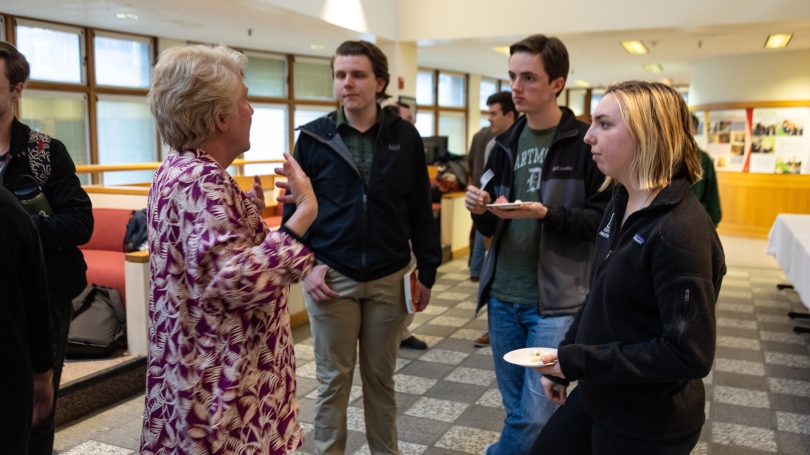
- Public Policy
- Leadership
- Funding
- News & Events
- About the Center
Back to Top Nav
Back to Top Nav
Back to Top Nav
Back to Top Nav
On Monday, April 15, 2019, History Professor Annelise Orleck and photographer Liz Cooke gave a talk titled “Photography and History: A Conversation” at the Rockefeller Center, discussing their collaboration on a recently published book, We Are All Fast Food Workers Now: The Global Uprising Against Poverty Wages. The book and its accompanying photography “try to document the new global economy,” according to Orleck.
Throughout the talk, the two cycled through a variety of photos of “those fighting for a living wage.” Professor Orleck described what she called a shift in perceptions since the 1980s: while companies used to care about their workers and communities, she asserted, now, their “highest priority” is their shareholders. She dates the beginning of the “fight for a living wage’ to 2012, which sparked her interest in this book.
One image depicted McDonalds workers and “Fight for $15” activist Bleu Rainer showing scars on his arm to the camera. Orleck and Cooke said these scars are present for anyone who had worked at McDonalds and used a fry vat, something that unites otherwise diverse and disparate workers across cultures.
Both Orleck and Cooke agreed that “respect” is “core to the crisis in neoliberalism right now.” Many of the photos shown were of people who they said were fighting for respect. Orleck and Cooke cited one group in Manila that organizes flash mob dances as a form of advocacy, often to the tune of Aretha Franklin’s famous “Respect.”
Several images shown were what Ms.Cooke called “hero shots.” They were of individuals that had taken action, such as organizing strikes at a Walmart or conducting union meetings in developing countries where they may be banned. “The struggle is real for people,” Cooke said she wanted to emphasize.
Other images showed undocumented workers in the United States, who often face discrimination and a lack of rights on the job due to their status. Orleck and Cooke emphasized the crucial role of undocumented workers in the American economy – “everyone who picks our berries” – and added that some have been “brutalized” for their efforts to unionize.
When asked what types of policy solutions exist for the conditions that those in the photos are fighting against, Prof. Orleck listed off several potential ideas. First and foremost, she said a “living wage” is necessary, but she also advocated for maternity and sick leave and additional measures to combat sexual violence in the workplace. She added that “corporations writing legislation” would prevent these things from happening.
Before We Are All Fast Food Workers Now, Orleck and Cooke collaborated on a 1999 book entitled Soviet Jewish Americans, and since then, Prof. Orleck has written several more books on activism. Ms. Cooke is the founder of Abandoned Hudson Valley, which photographs “abandoned and neglected places” in the Hudson Valley.
Several of Ms. Cooke’s original photographs were on display during a book signing and reception following the public event.
-Written by Kyle Mullins ’22, Rockefeller Center Student Program Assistant for Public Programs